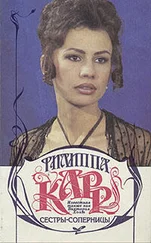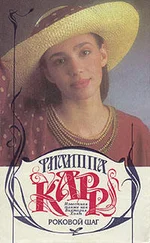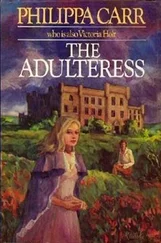Филиппа Карр - The changeling
Здесь есть возможность читать онлайн «Филиппа Карр - The changeling» весь текст электронной книги совершенно бесплатно (целиком полную версию без сокращений). В некоторых случаях можно слушать аудио, скачать через торрент в формате fb2 и присутствует краткое содержание. Жанр: Исторические любовные романы, на английском языке. Описание произведения, (предисловие) а так же отзывы посетителей доступны на портале библиотеки ЛибКат.
- Название:The changeling
- Автор:
- Жанр:
- Год:неизвестен
- ISBN:нет данных
- Рейтинг книги:5 / 5. Голосов: 1
-
Избранное:Добавить в избранное
- Отзывы:
-
Ваша оценка:
- 100
- 1
- 2
- 3
- 4
- 5
The changeling: краткое содержание, описание и аннотация
Предлагаем к чтению аннотацию, описание, краткое содержание или предисловие (зависит от того, что написал сам автор книги «The changeling»). Если вы не нашли необходимую информацию о книге — напишите в комментариях, мы постараемся отыскать её.
The changeling — читать онлайн бесплатно полную книгу (весь текст) целиком
Ниже представлен текст книги, разбитый по страницам. Система сохранения места последней прочитанной страницы, позволяет с удобством читать онлайн бесплатно книгу «The changeling», без необходимости каждый раз заново искать на чём Вы остановились. Поставьте закладку, и сможете в любой момент перейти на страницу, на которой закончили чтение.
Интервал:
Закладка:
This was the constituency so there was a good deal to do here. Benedict was determined to show all the people who had elected him what an excellent M.P. he was and they were encouraged to call and discuss their problems.
Eager to be the perfect wife, my mother threw herself wholeheartedly into his life. It was a busy one. They would travel round the constituency which extended several miles into the surrounding countryside and it included many villages and several small towns. “Your stepfather does not wish anyone to feel neglected,” said my mother.
It was an embarrassment to mention him. She would have liked me to call him Father but even for her I could not do that. As for him, I was not sure what he wanted.
He was too clever not to know how I felt about him, even though my mother tried to pretend that my hostility did not exist. He would not let it be of any great concern to him. It was my mother who was unhappy about it although she showed nothing. I was glad of that because if she had told me how unhappy my attitude made ^er I should have had to do something about it and I did not want to. I realize now that I had a certain satisfaction in harbor, ing my resentment.
Still, I did like Manorleigh. So did Miss Brown.
We were still working on the Prime Ministers and were no\v concerned with Mr. Disraeli and Mr. Gladstone.
“Of course,” said Miss Brown, “it is not easy to discover little facts about our contemporaries. It is only when people are dead that their little secrets come out.” We used to ride together and sometimes I went out with my mother and her husband. He liked that. It gave a good impression. I imagine he liked people to think that we were a happy family and in spite of his insouciance he must have realized he had something to live down on that score.
I grew to like my room. It had leaded windows, a great beam across the ceiling and the floor sloped a little. But what I liked best was that it looked down on the garden to an ancient oak tree under which was a sundial and a wooden seat. It was very picturesque and I felt a sense of peace when I looked out on it, past the pond on which floated water lilies and over which the figure of Hermes-winged sandals, staff wreathed with serpents, broad hat, sporting wings and all-was poised.
I found a great pleasure in making my way through the overgrown rose trees and sitting for a while on that seat. It seemed so peaceful there.
As soon as we were settled in, the round of visits began. There were dinner parties and what were called soirees when perhaps some well-known musician would come and play the piano or violin. There were always important people to entertain. Fortunately I did not have to be present on these occasions. My mother seemed to enjoy them. She said to me one day: “Do you know, Rebecca, I think I am turning into a good politician’s wife.”
“You mean, Mama,” I replied, “the good wife of a politician. The way you say it makes it sound as if it is the politician who is good.”
“Well, he is, isn’t he?”
“I don’t think that was what you meant to say.”
“I am glad to see Miss Brown is keeping you well versed in your grammar.”
She looked faintly disturbed as she always did.
Then Benedict-though not mentioned by name-crept into le conversation.
But it was true that she was enjoying her new way of life. “I love meeting all those people,” she said. “Some of them a trifle pompous. We have a good laugh over them afterwards.”
Yes. She shared things with him from which I was shut out. I knew in my heart that I was being foolish and unfair. It was I who was deliberately shutting myself out. Sometimes I tried to accept the situation, and I would for a while. Then all the old resentments would flare up.
Mrs. Emery said she was unable to do justice to her new position as she was expected to do so much cooking.
“But, of course,” replied my mother. “How thoughtless of me. We must get someone to cook.”
Mrs. Emery was secretly delighted.
“I suppose,” I said to my mother, “a housekeeper is of higher rank than a cook ... hence her delight.”
“Mrs. Emery will, of course, be in charge of the household.”
“As we have become grander, so has she,” I commented.
“Well, naturally so,” retorted my mother.
The news quickly circulated that the new member needed a cook at Manorleigh and Mrs.
Grant appeared.
My mother liked her from the first and when she heard that her mother had been cook at Manorleigh and before that her grandmother, she knew that Mrs. Grant was the one for us.
She was a fat jolly woman with rosy cheeks and sparkling blue eyes. She had masses of rather untidy fair hair and her ample figure suggested that she liked eating food as well as cooking it.
‘All to the good,” said my mother. “You have to feel enthusiastic about something to do it well.”
Mrs. Grant took charge of the kitchen and it soon became clear that we had a treasure in her. She and I took a fancy to each other from the start and she soon discovered my fondness for the garden.
She was a great talker and liked me to go into the kitchen when she was, as she said, pampering herself with a nice cup of tea and giving her feet a treat at the same time.
“It’s my time of life,” she said. “I don’t like to stand more than I can help and a little sit-me-down in the afternoon . that’s a bit of heaven to me.” One day she said to me: “You like the garden, don’t you?” She filled up her cup and poured one out for me. “Did you feel there was something special about it?”
“Yes,” I replied. “There is something about it. I think it is because of those overgrown trees. I hope no one touches them.”
“So do I. They wouldn’t like that.”
“Who?”
She grimaced and pointed upwards. I looked astonished and she drew her chair closer to mine.
“You’ve heard of houses being haunted, have you?”
I nodded.
“This is a bit different. This is a garden that’s haunted.”
“Is it really? I’ve never heard of a haunted garden.”
“Any place can be haunted. Doesn’t have to be within walls. I just had the feeling you’d found out something out there. You’re always sitting under that old oak. Why?”
“Well, it’s shut away. It’s peaceful there. When I’m sitting there I feel ... apart.”
She nodded. “Well, that’s it. That’s the spirit. That’s where the ghost used to come.”
“Used to?”
“Well, there’d be no call for it now ... not after Miss Martha went.”
“Tell me the story.”
“It was in my grandma’s day. She was the cook here. Lady Flamstead came ... a lovely lady, my grandma said. She came here as a bride. He was a lot older than she was, Sir ... what was his name? ... Ronald, I think.”
“What happened?”
“It was a happy marriage. Like two lovebirds, they were, my gran said. They all loved her. She was so young ... so excited by it all. She hadn’t been used to a grand way of living ... till he married her. She just enjoyed everything. Then came the day when she was going to have a baby. My gran said you should have seen the fuss. Sir Ronald ... well, he wasn’t all that , I suppose, but he was beside himself with joy ... and as 0 ‘Lady Flamstead, she was in heaven.”
“And …” I prompted.
“Well, everyone was so pleased. They were making such lans. My gran said you’d have thought nobody had ever had baby before. Nursery done up ... little toys everywhere and then ... Lady Flamstead ... she didn’t come through ? There was the baby they’d longed for ... a little girl... but she was the end of her mother.”
“How terribly sad!”
“Yes, wasn’t it? The change in that house! They were all going to be so happy ... You see, she was the one who had made it all like that. Without her ... it was all changed. My gran said Sir Ronald ... well, he was a good enough master, but he didn’t have much to do with any of them. She’d changed all that. They’d all loved her ... and now she was gone.”
Читать дальшеИнтервал:
Закладка:
Похожие книги на «The changeling»
Представляем Вашему вниманию похожие книги на «The changeling» списком для выбора. Мы отобрали схожую по названию и смыслу литературу в надежде предоставить читателям больше вариантов отыскать новые, интересные, ещё непрочитанные произведения.
Обсуждение, отзывы о книге «The changeling» и просто собственные мнения читателей. Оставьте ваши комментарии, напишите, что Вы думаете о произведении, его смысле или главных героях. Укажите что конкретно понравилось, а что нет, и почему Вы так считаете.






